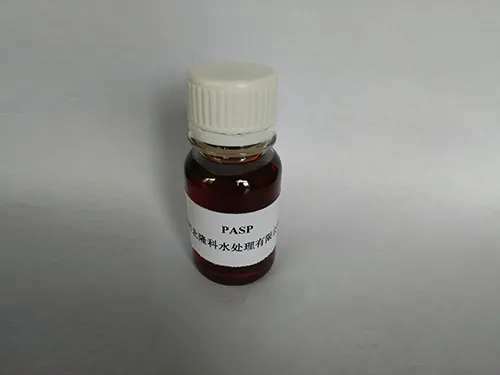Revolutionize Maintenance: Scale Inhibitors for Reliable Performance
In industrial systems, maintenance is a critical factor in ensuring smooth operations and reducing costly downtime. One often overlooked but highly effective way to revolutionize maintenance is by utilizing scale inhibitors. These powerful chemicals play a pivotal role in preventing the buildup of scale, ensuring that systems run efficiently and reliably.

Polyaspartic Acid: A Key Player in Scale Prevention
When it comes to controlling scale, polyaspartic acid is a highly effective chemical that prevents mineral deposits from forming and adhering to surfaces in water-based systems. This acid works by breaking down scale-forming minerals, preventing them from crystallizing into hard, damaging scale. In systems where scale buildup can disrupt operations, sodium of polyaspartic acid offers a reliable solution.
Industries such as water treatment, cooling towers, and power plants rely on polyaspartic acid to keep their systems free from mineral buildup. Its superior ability to disperse scale-forming minerals helps maintain the efficiency of heat exchangers, pipes, and pumps, leading to reduced maintenance needs and longer system lifespans. Whether used in high-temperature or aggressive water chemistry systems, polyaspartic acid proves to be an essential component in maintaining reliable performance.
Polyaspartic Acid Sodium Salt: The Enhanced Solution for Scale Control
For even more powerful scale control, polyaspartic acid sodium salt provides enhanced performance. This sodium salt form of polyaspartic acid boasts higher stability and improved efficiency in preventing scale formation across a variety of industrial applications.
When introduced into water systems, polyaspartic acid sodium salt works by effectively disrupting the crystal structure of calcium, magnesium, and other minerals that cause scale. As a result, minerals remain suspended in the water, preventing them from settling on vital equipment. The sodium component enhances the solubility of polyaspartic acid sodium salt, making it particularly effective in preventing both calcium carbonate and calcium sulfate scale in complex systems such as cooling towers, industrial water treatments, and boilers.
Scale Inhibitor: The Essential for Long-Lasting Equipment
A scale inhibitor is a critical tool in maintaining the efficiency and longevity of systems that are exposed to water. Over time, scale buildup can damage equipment, reduce efficiency, and increase maintenance costs. By integrating a scale inhibitor into your maintenance routine, you can prevent these issues from occurring.
The role of a scale inhibitor is to prevent minerals from crystallizing into scale by either dispersing them or interfering with their ability to form solid deposits. This helps to maintain consistent performance and extends the service life of equipment. Whether you're dealing with hard water in a power plant or managing water systems in a cooling tower, using a scale inhibitor will ensure that mineral buildup doesn’t hinder operations.
Limescale Inhibitor: Protecting Critical Infrastructure
A limescale inhibitor is a specialized type of scale inhibitor that targets limescale, the calcium carbonate deposits commonly found in water systems. Limescale buildup is notorious for reducing system efficiency and causing corrosion over time. In industries that rely on heat exchangers, pipes, and boilers, limescale inhibitors are indispensable.
By adding a limescale inhibitor to your water treatment system, you can prevent these harmful deposits from forming. These inhibitors work by dispersing calcium carbonate crystals and preventing them from adhering to surfaces. This ensures that heat transfer remains efficient, systems stay free from obstructions, and maintenance costs are minimized. With a limescale inhibitor in place, you can protect vital equipment and reduce the need for frequent cleaning and repairs.
Enhancing Maintenance with Scale Inhibitors: A Proactive Approach
Using polyaspartic acid, polyaspartic acid sodium salt, and limescale inhibitors as part of a proactive maintenance plan can save your business significant time and money. These scale inhibitors are designed to prevent the mineral buildup that leads to system failures, costly repairs, and increased downtime. By incorporating them into your maintenance strategy, you not only ensure the reliability of your equipment but also extend its operational life.
With the right scale inhibitor, industries can enhance performance, reduce energy consumption, and keep their systems running smoothly for longer periods. By preventing scale formation, you can avoid the headaches associated with mineral buildup and focus on what truly matters—maintaining efficient and reliable operations.
These inhibitors provide a simple yet effective way to keep systems running at their best, ensuring longevity and performance even in the harshest environments. Embrace scale inhibitors today and revolutionize your approach to maintenance for more reliable, cost-effective operations.
-
Understanding Polycarboxylic Acids: Properties, Applications, and Future PotentialNewsJul.28,2025
-
Scale Inhibitor Explained: How to Protect Your System from Limescale and Hard Water DamageNewsJul.28,2025
-
Scale and Corrosion Inhibitors: Essential Chemicals for Industrial Water System ProtectionNewsJul.28,2025
-
Polyaspartic Acid: A Biodegradable Polymer for Sustainable ChemistryNewsJul.28,2025
-
Isothiazolinones: A Versatile Antimicrobial Class with Industrial Power and Regulatory ChallengesNewsJul.28,2025
-
A Deep Dive into 2-Phosphonobutane-1,2,4-Tricarboxylic Acid (PBTC)NewsJul.28,2025





